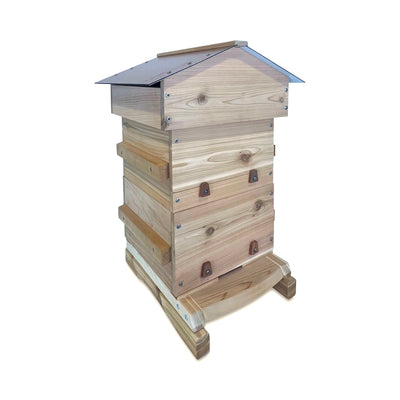Vineyard and Apiary: Part II
For part II of our visit with Dundee Hill wineries, I visited Winderlea Winery and Vineyard. Winderlea stretches 20 acres across a stunning hillside and produces around 5000 cases of wine per year. The vineyard has employed Biodynamic agriculture practices since 2009 and is currently working on becoming Biodynamic certified. They have been a certified B corporation since early 2015.
Owner, winemaker, and Warré beekeeper Bill Sweat joined us to discuss the role honeybees play in his vineyard ecosystem and show us his hive.



How did you get started beekeeping?
Beekeeping, I guess, is a generous term for what we do. I’ll fold it in with our goal of sustainability. We farm biodynamic here; we’ll be biodynamic certified here in the next year, but we’ve been farming biodynamic since 2009. Early this year we became a certified B corporation and we’re tying to be sustainable across all our business practices. We think of [beekeeping] as another piece of that. It’s a small vineyard here and we don’t have a lot of animals on the property. We try to pick little elements here and there that can add a little bit of diversity. We have some chickens, and we’re also concerned about bee die-offs so decided to put a colony on the property. We’re not in a big beekeeping area, so we thought we could contribute. We do almost nothing to manage the hive— it’s just there so the bees have a place to live. We haven’t taken honey from the hive yet, but we probably will this year. By and large it’s been a very passive endeavor for us, just to try and keep bees in the area. We use no chemical treatments of any kind so it’s a very natural colony—they’re getting along on their own with very little human intervention.
That’s very interesting. We notice that there are more beekeepers than you’d expect who manage their hives that way. The reputation of beekeepers is that they intensively manage their hives, but there’s a sizable portion that just let their bees do what they need to.
That’s good to hear! I was feeling like a slacker.

What kind beehive design do you use, and how did you decide?
First of all, you guys have a great website and it’s very easy to get around and learn different things. I don’t remember who told me about Bee Thinking…we started doing research online, and we knew it would be a hands-off endeavor; we wanted to create a passive environment for the bees so we use a Warre hive. For us, it felt like a good way to create an environment that’s as natural as a man-made structure is going to be.

How do see your bees fitting into the broader landscape of the vineyard?
Part of the requirement for a lot of sustainability programs involves trying to avoid monocultures, and a vineyard is a monoculture— you plant a vine and it’s there for fifty years or more. There are things we do that are temporary, like cover crops, that are attractants for different kinds of insects and things, but then we mow them down. We try to create these buffer areas with [more diversity] and we try to stay away from them, so part of keeping bees in the environment is the same kind of thinking. How can we, in our small 20 acres piece, which is planted wall-to-wall to vineyard, create these little pockets of diversity within the site? How can we respond to a problem that exists in the world with colony collapse? We think of bees in this way, and similarly with bringing chickens on to the farm. They did an awesome job cleaning out our raised beds this year. If we can find little things we can do here and there to add an element of diversity, our hope is that over time we’ll build a more robust and balanced environment for our vineyard.

Do you have any advice for beginning beekeepers?
For me, I suffer from something a lot of guys suffer from, which is that it’s hard for me to do things I’m not an expert in. We make things overly daunting for ourselves, so just find a place you can go whose goal is to educate people on the thing you don’t know. Bee Thinking was perfect for us because we could go and sit in a seminar among a bunch of other people who were experiencing the same quandary we were experiencing. When you have this fear of not being an expert you spend all this time reading but you get no reinforcement of those ideas.

Do you have a favorite part of beekeeping or beekeeping experience?
Every morning we go out and feed the chickens, and my wife and split that job, and generally on the way back I’ll go over and check on the beehive to see how much activity there is. That always raises questions for me, because I’m not an expert yet, so that’s a routine I enjoy doing.







Leave a comment